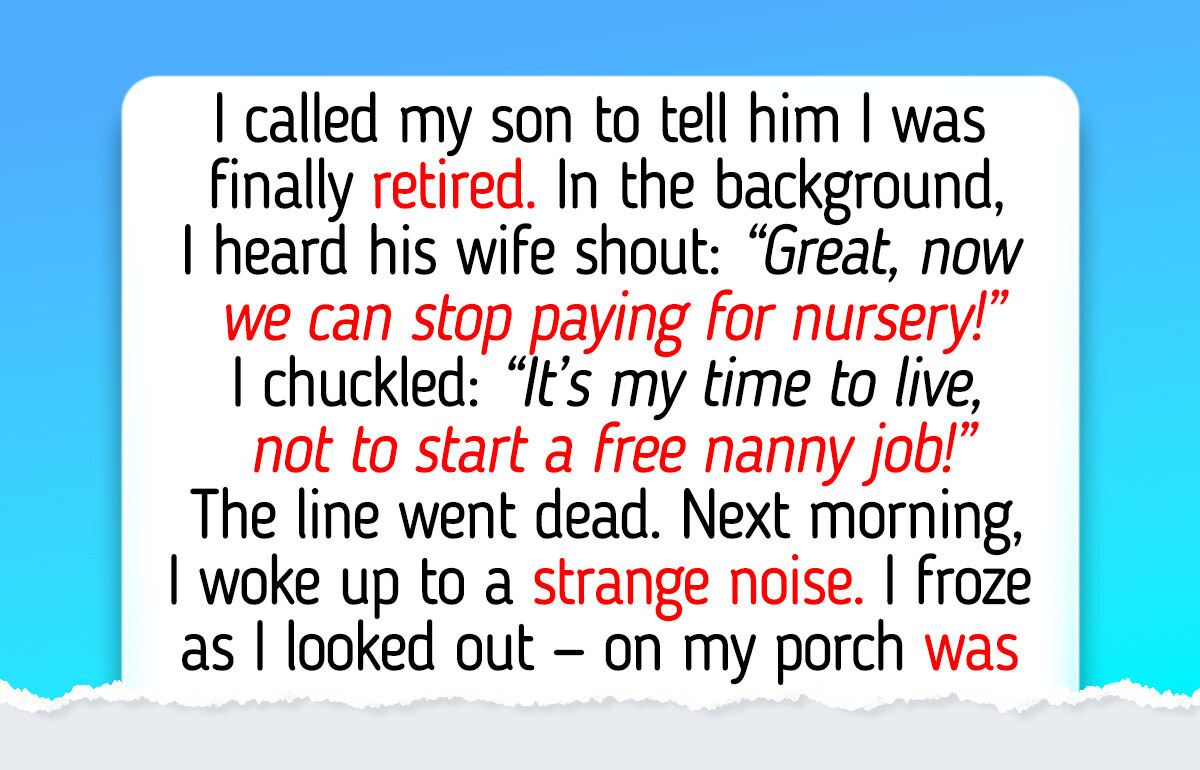You TELL THE DELIVERY COMPANY THAT YOU ARE NOT ACCEPTING ANY DELIVERIES, WITHOUT KNOWING WHERE THEY CAME FROM, AND APPROVED BY YOU. Then, DONATE EVERYTHING ALREADY DELIVERED, TO A LOCAL SHELTER. Many women are in shelters with new babies. Then TELL YOUR SON AND DIL, you WON'T BE BULLIED. They WILL try to emotionally blackmail you. If you LET THEM, that's on YOU.
I Refused to Sacrifice My Retirement to Be a Free Nanny — but Nothing Prepared Me for My DIL’s Response

Family dynamics can become complicated when expectations clash, especially around childcare and retirement. Many parents dream of finally enjoying their golden years, but sometimes their adult children have very different plans. Recently, one reader sent us a letter about the shocking way her daughter-in-law reacted to her retirement.
Here’s Petra’s letter:
Hi Bright Side,
I called my son to tell him I was finally retired. In the background, I heard his wife shout: “Great, then we can stop paying for nursery!” I chuckled nervously and replied, “It’s my time to live, not to start a free nanny job!” The line went dead. The next morning, I woke to a strange noise outside. I froze as I looked out — on my porch was a delivery van, unloading box after box. Soon, the porch was stacked high with baby formula, diapers, toys, and wipes—everything needed to care for a child. This wasn’t a mistake. My DIL had sent them, a silent declaration that my retirement now belonged to their childcare.
I stood there surrounded by baby supplies, my excitement for freedom colliding with a new, unwelcome reality. I love my family, but I cannot sacrifice the life I’ve worked so long to reach. Now I’m left with an impossible choice: how do I protect my hard-earned independence without shattering my relationship with my son?
Sincerely,
Petra

Thank you, Petra, for sharing your story with us. To support you in this difficult situation, here are four different pieces of advice that may help you balance your retirement dreams with your family’s expectations.
Set Clear but Loving Boundaries
Your retirement is a milestone you’ve earned, and it’s important to protect that time without alienating your family. The best way forward is to sit down with your son privately and explain your feelings calmly but firmly. Emphasize that while you adore your grandchild, you cannot take on a full-time role as a caregiver. Offer to spend time with the baby occasionally on your own terms, so they know you’re still present. Boundaries framed with love often strengthen relationships rather than weaken them.
Protect Yourself With a Gentle but Firm Stand
Sometimes, the healthiest choice is to stop sugarcoating your limits. If you quietly accept those deliveries, you risk being forced into a role you never agreed to. Return the baby supplies with a kind note making it clear that this is not your responsibility. Explain that you want to enjoy your new chapter while remaining a loving grandmother, not a stand-in daycare. Being firm now may feel hard, but it prevents deeper resentment later.
Turn the Gesture Into a Conversation Starter

OMG I can't believe what you just told her " Instead of seeing the delivery as only an insult, treat it as an opportunity to open dialogue". Are you kidding me. the DIL & her son didn't even have the common courtesy to ask just demanded. OMG shame on them & you for this poor advise.
Instead of seeing the delivery as only an insult, treat it as an opportunity to open dialogue. Ask your daughter-in-law directly if she feels overwhelmed and whether this was her way of asking for help. Sometimes what comes across as pressure is actually a cry for support. By listening to her side first, you may soften the tension and gain her respect. Once her concerns are acknowledged, you can explain your own needs and find a middle ground.
Offer Alternatives Without Becoming the Nanny
Your daughter-in-law clearly wants to cut costs, but you can suggest options that don’t compromise your retirement. Research local daycare subsidies, part-time sitters, or community programs that might ease their financial load. Share these ideas with your son so they see you as supportive rather than rejecting. If you can help occasionally—like one afternoon a week—make it clear that this is voluntary, not an expectation. This way, you contribute to their relief without giving up your freedom.
Life has a way of surprising us with challenges we never saw coming, and sometimes those tests strike right at the heart of our closest relationships. One of our readers recently shared her story about how her husband chose to take care of his sick ex-wife—and why she now regrets ever agreeing to it.
Comments
These stories are all fake, but they are entertaining!
Tell her, NIO!! End of discussion. Tell your son the same Not your responsibility. Been there
To hell with free I'd sell that stuff at a lower price and earn a profit. That would be my power move. Like b**** you got some balls. Allow me to disabuse you of those balls. You wanna bully me so you can save a buck. I'll make a buck off YOUR back and see how you like that. You will not use your kids as leverage against me. I'll be your worst nightmare. Screw monster in law I'll be the hand that rocks the mf cradle.
It was their decision to have a child not your obligation to provide free childcare. Not your responsibility nor problem. Suggest you find a hobby & enjoy your well deserved retirement.
Tell the driver you didn't order anything and refuse it. Give him a $20 under table to return to sender saying no one was home.
Then find hobbies or reasons you not available or if she pushes you to babysit, send kids back to her on a sugar high, and let them sleep most of day so they won't sleep at night and she'll have to deal with them awake all night.
Related Reads
I Chose My Cat Over My Stepson—Now Everyone Says I’m the “Wicked Stepmother”

I Refuse to Earn Pennies While My Manager Cashes a Fortune

12 Moments That Show Romance Is Really About Small Acts of Kindness

I Refused to Pay for Our Valentine’s Dinner—Then I Learned the Heartbreaking Truth

15 Moments That Prove Kindness and Mercy Are Quietly Saving the World

My DIL Refuses to Let Me Babysit My Grandson, She Wasn’t Ready for My Payback

HR Fired Me Right Before My Vacation, So I Used It Against Them

I Turned Down a Promotion and Got Fired—My Revenge Was Brutal

15 Stories That Prove Some Memories Are Impossible to Delete

10 True Stories With Endings So Wild, Hollywood Couldn’t Write Them Better

14 Quite Acts of Kindness That Changed Someone’s Life Forever

10 Bosses Whose Unrealistic Demands Led to a Disaster

